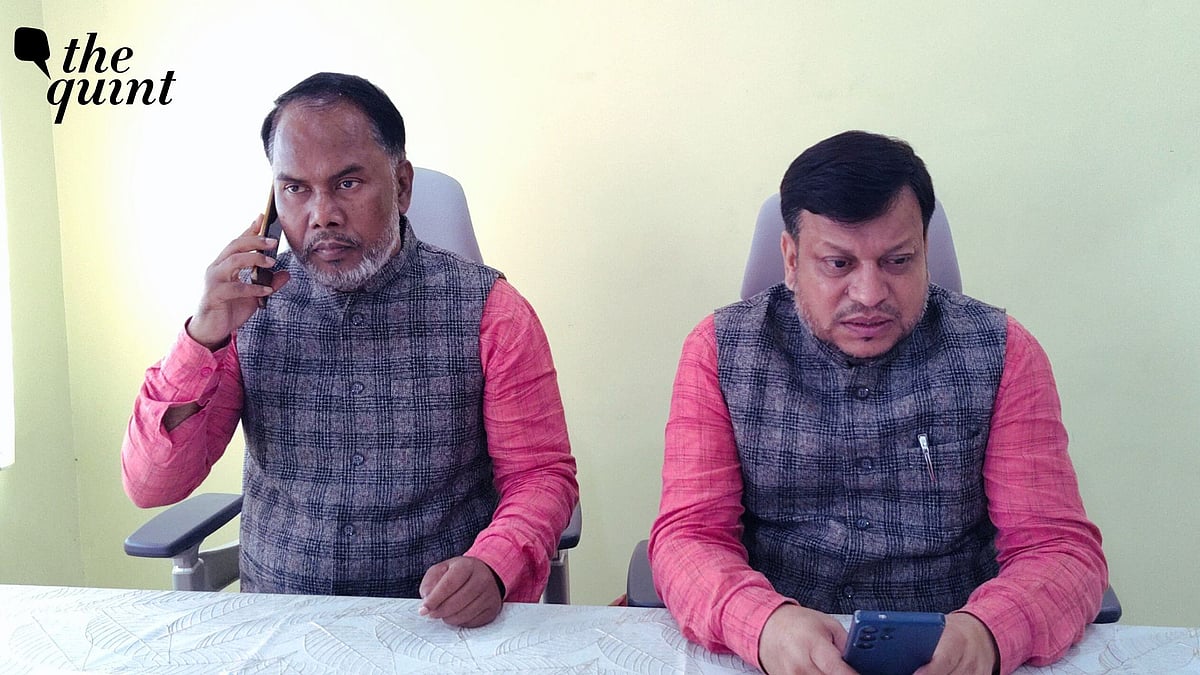
How a Hindu–Muslim Duo Is Rewriting Community Politics in Bihar's Seemanchal
Aftab-Kanchan's unity challenges traditional politics in Bihar.

advertisement
Dressed in strikingly similar attire, two friends, one Hindu and one Muslim, leave from the same house in Katihar’s Salmari every morning for election campaigning. In the records of the Election Commission, only Aftab is listed as the official candidate contesting the Bihar Assembly elections from the Pranpur constituency. But in all campaign materials circulating on social media, in pamphlets distributed throughout the day, and on the loudspeakers mounted on their campaign vehicle, the appeal is to vote for Aftab Kanchan.
“A muscleman was troubling me in my village in 1993. We are a minority there, and at that time Aftab helped me,” recalls Kanchan, sitting on a bench in a playground overlooking preparations for Owaisi’s rally the next day.
“I got in touch with Kanchan in 1993; our friendship started in 1994. So yes, it’s been 31 years,” says Aftab during a door-to-door campaign several kilometres away from Kanchan, in a village in the Azamnagar block.
(Photo: Tanzil Asif/The Quint)
“We are only recognised if spoken of together — as Aftab–Kanchan or Kanchan–Aftab. If you take our names separately as Aftab Alam or Kanchan Das, no one will know. Even in family functions, invitations go out in the name of Kanchan–Aftab or Aftab–Kanchan,” adds 54-year-old Kanchan.
The Aftab-Kanchan Model
Aftab and Kanchan are not just contesting elections together; they also share land, businesses, homes, and other assets. Their names appear jointly on business and land documents. Aftab’s affidavit filed with the Election Commission lists around 30 land assets bought between 2009 and 2025 — all shared with Kanchan.
“My businesses, land, home — everything is shared with him. We have joint bank accounts, and they are operated jointly,” says 44-year-old Aftab, the younger of the two.
The duo are civil contractors and jointly run a firm called Raj Construction.
“I have two children; he has one. Our families are deeply connected. We are always there for each other in all ups and downs,” says Aftab. “We also celebrate all Hindu and Muslim festivals together.”
But this inseparable friendship sometimes creates confusion. When they applied for the party ticket, the name Aftab–Kanchan caused misunderstandings.
“Everywhere we send our bio-data as Aftab–Kanchan alias Kanchan–Aftab. When confusion arises, I clarify that Aftab Alam is the candidate, and I am his supporter,” says Kanchan.
“When Aftab saved me in 1993, I decided that I would not rest until I helped my friend reach a powerful position,” he adds.
“I suffered from gallbladder cancer last year. My parents and elder brother have passed away. Aftab and his family stayed with me in Delhi for nine months. Not just this life — I want Aftab as a friend for seven reincarnations,” says an emotional Kanchan.
(Photo: Tanzil Asif/The Quint)
“I worked for Congress here for ten years. We built a strong cadre base. We didn’t get the ticket in 2020, but we stayed. This time I was a strong contender, but again we didn’t get it. So I discussed it with supporters, and everyone agreed that we should contest on a party ticket, not as independents,” says Aftab.
The Caste Equation
AIMIM is contesting 29 seats in the Bihar elections — 15 of them in the Seemanchal region (Kishanganj, Purnia, Katihar, and Araria). The region has 24 seats. AIMIM won five seats in 2020, though none from Katihar. In Pranpur, the party’s candidate then secured just 508 votes (0.25%).
Pranpur, with a 49% Muslim population — mostly Surjapuris followed by Shershahbadis — hasn’t had a Muslim MLA for more than three decades. The major Hindu castes in the constituency are Rajbanshi, Yadav, and Mallah.
Aftab is a Surjapuri Muslim, and Kanchan belongs to the Rajbanshi community. “One of the reasons for projecting ourselves as joint candidates is the caste equation,” Aftab explains.
“In every booth, both Hindus and Muslims will vote for us,” says Kanchan.
The duo dismiss talk of any future friction.
“I have no greed for any post. I accept my friend as my leader. If Aftab wins, the world will know that Aftab also means Kanchan. I may not enter the Assembly legally, but outside, I will handle everything and enjoy equal respect. The administration knows that Aftab and Kanchan are two names but one soul.”
At a rally on 6 November, Owaisi described them as Aftab–Kanchan ki jodi (the Aftab–Kanchan pair). Throughout his speech, Aftab and Kanchan stood beside him, both in crimson kurtas, white pyjamas, and black-grey shadri with a square-box pattern — like two inseparable twins.
- Access to all paywalled content on site
- Ad-free experience across The Quint
- Early previews of our Special Projects
Published: undefined